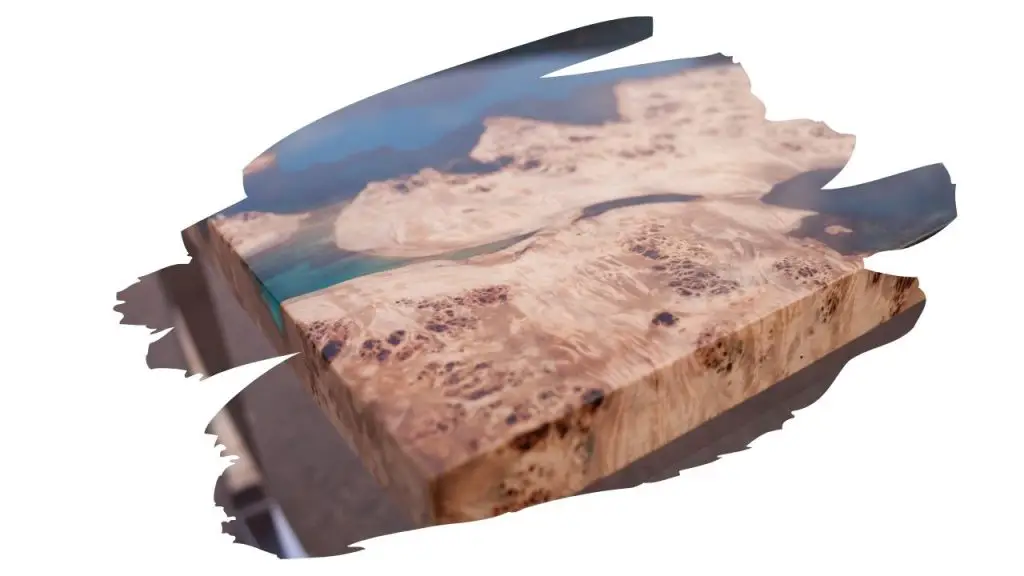When it comes to finishing wood, you have a whole lot of options. From shellac to varnish, olive oil to raw linseed oil, the range is bewildering.
Choosing the right finish, however, isn’t just about maintaining the good looks of wood grain. It is also about protecting wood from moisture and scratches. As well as doing the utmost to prevent rot, mildew, and bugs from burrowing in.
But, not all wood finishes are equal when it comes to offering the full-protective package. In fact, some finishes are great at water-resistance, yet are poor at completely sealing wood from moisture or long-term wear and tear.
A great example of this is Linseed Oil. This natural finish likes to soak into wood, (and seal it in a water-repellent shield). And it does a pretty decent job at withstanding mold and rot.
But linseed oil is not waterproof, and it is more than a little susceptible to water ring damage.
On the other hand, epoxy is a chemical substance that completely seals wood – stopping anything from getting through. It is also incredibly durable, and a much more sturdy resin than linseed oil.
So, if you want the complete finish, why not combine the two and coat epoxy over linseed oil? Makes sense right?
Well, you can apply epoxy over a linseed oil finish, provided that the linseed oil is wholly dry and fully cured. If you apply epoxy to a linseed oil resin coat that hasn’t cured, then epoxy won’t bond to it.
But, here’s the thing… linseed oil is great at enhancing natural wood grain. While, epoxy can leave wood looking a bit plastic.
Now, combining these two solutions makes for an incredibly durable finish. However, the final result will not give you a realistic looking wood surface.
So, with that said, here are a few things you need to know before you go rushing off to top that oil coat with epoxy…

This post may contain affiliate links to products that we receive a commission for (at no additional cost to you). Learn more here.
Okay, So First Things First… Can You Seal Any Wood That Has Been Oiled?
As long as the oil has cured, then yes, you can apply sealer such as epoxy over it.
But, it is important to emphasize here that the oil has to be ‘cured’, not merely ‘dry’. And what’s the difference between the two? Well, it all boils down to chemistry.
When an oil finish is dry, it means that solvents in the oil have evaporated, leaving behind a resinous film. This film feels dry to the touch, but still has a bit of give (i.e. it hasn’t hardened).
This process takes around 3 days when it comes to Linseed Oil.
Related Post: How To Make Linseed Oil Dry Faster (What You Need To Know)
But when an oil finish is cured, it means that resinous film has just been through a chemical process. This process changes that film into a hard scratch-resistant resin.
This curing process can take as long as 10 weeks when it comes to Raw Linseed Oil (or as little as 3 days with a Boiled Linseed Oil alternative).
But, Not All Oil Finishes Can Actually Cure? Right?
This is true. Some oil finishes such as Mineral oil (a popular finishing choice for butcher blocks) simply don’t cure at all.
So if you where to try and seal these non-curing finishes with epoxy, it won’t work. The oil literally makes it hard for epoxy to stay on.
Related Post: Can You Really Varnish Over Linseed Oil? (Best Practice Revealed)
Do You Need To Seal Linseed Oil?
Linseed oil does a great job at preventing mold from growing underneath the surface of wood. This is key if you want to stop wood from rotting away, as the oil will repel damp and moisture.
However, linseed oil is not a sealant, in that it is not wholly waterproof. If you want to seal wood, you are going to need something extra such as polyurethane, lacquer or varnish.
Related Post: What Is The Difference Between Lacquer and Polyurethane?
So, you will need to add a sealer on top of linseed oil. Especially if that linseed oil coat is on something that will go through a lot of wear and tear (like say, for example, a table top).
So To Sum Up…
If you are worried that water damage or scratches could mar that linseed oil finish, then you will need to add a sealer on top of it.
In which case, a hardwearing coat of epoxy is perfect. You can apply epoxy over linseed oil to give your wood craft a scratchproof durable coat that’ll last a very long time.



